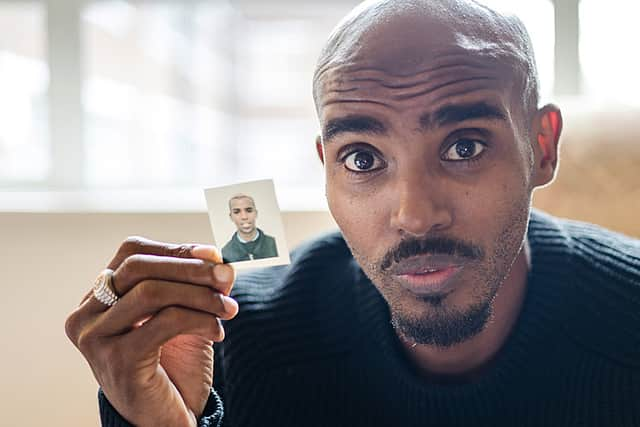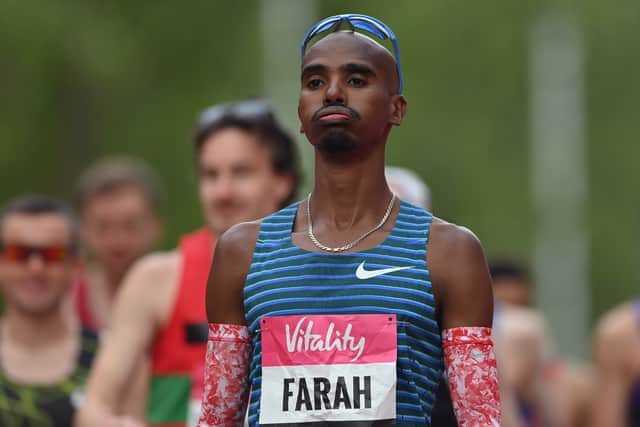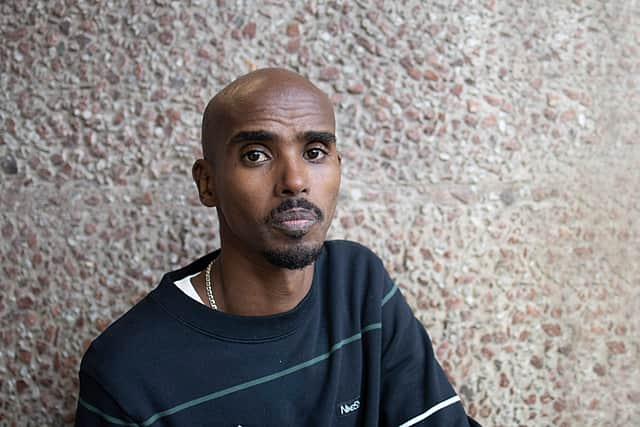Sir Mo Farah: London modern slavery charges fall by THIRD, despite rise in offences
and live on Freeview channel 276
Charges for modern slavery offences in London have fallen by one third - despite a rise in the number of alleged incidents being recorded.
It comes as the athlete and four times Olympic gold medallist Sir Mo Farah revealed he had been living under a false identity since being trafficked to the UK as a child, in a shocking BBC documentary.
Advertisement
Hide AdAdvertisement
Hide AdJust 18 people were charged with modern slavery offences in London in 2021 - despite more than 2,400 alleged incidents being recorded that year, data suggests.
Reports of trafficking rose by almost 8% on the previous year, while the number of people charged with the crime fell by a third, a Human Trafficking Foundation (HTF) report found.
While Home Office data revealed more than 5,000 children were also trafficked across the UK last year, meaning on average almost 14 children were exploited each day.


And 275 of these were used - like Sir Mo - for domestic servitude, which charities and experts say is the “most hidden” form of abuse and the “most challenging to identify”.
Advertisement
Hide AdAdvertisement
Hide AdThese figures for children include data for British-born children who have suffered sexual exploitation and county lines drug trafficking.
Modern slavery in London predominantly occurred in Croydon, Newham, Enfield, Southwark and Haringey, with the five boroughs making up more than 27% of all cases in 2021.
Barking and Dagenham, Waltham Forest and Lambeth also all saw more than 100 cases.
Southwark and Enfield were also among the boroughs with the top five biggest increases in modern slavery cases, with 18% and 32% rises respectively.
Loading....
Advertisement
Hide AdAdvertisement
Hide AdLewisham, Brent, and Westminster saw 22%, 26% and 38% rises in alleged offences.
The data may in fact undercount the number of victims, as some offences may relate to multiple victims which do not all get referred to the NRM, while incidents reported in London which relate to another police force may not be included.
Sir Mo has revealed he was born Hussein Abdi Kahim in Somaliland, east Africa, and brought to the UK under the name Mohamed Farah - and has since named his son after his birth identity.
His passport was ripped up and he was forced to work and prevented from contacting his family - before confiding in his PE teacher, who helped him find a foster family and get British citizenship.
Advertisement
Hide AdAdvertisement
Hide AdThe father-of-three revealed his past in the BBC film, The Real Mo Farah, which will air on Wednesday, July 13, and includes a moving conversation with the real Mohamed Farah.


Home Office statistics via the national referral mechanism (NRM), the official route for reporting modern slavery concerns, indicate of the 12,727 victims of modern slavery in the UK in 2021, 5,468 of these were children (aged 17 and under).
And 275 of these children were trafficked either solely for the purposes of or for the purposes of including domestic servitude - like Sir Mo.
Other categories of cruelty included criminal, labour, and sexual exploitation as well as organ harvesting, and combinations of all of the above.
Advertisement
Hide AdAdvertisement
Hide AdBut Laura Duran, policy officer at ECPAT UK, a child exploitation charity, said child domestic servitude - which involves children working as unpaid servants - is a hidden form of abuse.
She said: “Domestic servitude is a form of exploitation where the person or child will be put to work within the domestic setting, for example chores or caring for younger children.
“They are vulnerable to all forms of physical abuse, sexual abuse, and neglect.
“They are made to work, they often can’t attend school, and even if they are receiving an education, they are managing a huge workload alongside this.”
Loading....
Advertisement
Hide AdAdvertisement
Hide AdDomestic servitude, Laura said, “consistently ranks the lowest” in government data on the issue of child exploitation, “because of the even more hidden nature of this form of abuse”.
She said: “Children may have very few opportunities for contact with public authorities. In some cases children are not taken to a doctor even if they are seriously ill.”
Traffickers who abuse children in this way tend to be “one off” or “single offenders”, Laura added.
“They can be quite reputable community members - we’ve seen diplomats, doctors, lawyers who have trafficked a child for domestic servitude,” she said.
Advertisement
Hide AdAdvertisement
Hide Ad“It definitely does stem from harmful traditional practices from people’s home countries. It’s more common to find very young children employed in domestic work in countries where there isn’t a strong safety net.
“Families might be really struggling and think this is a good opportunity for the child to get an education.
“A lot of traffickers think they’ve helped the child as they got them to this country and got them a job. Even those who are prosecuted are kind of baffled at the situation.
“We’ve had cases where children came out against their traffickers and their entire church community shunned them as they were seen as completely ungrateful.
Advertisement
Hide AdAdvertisement
Hide Ad“In some cultural settings this abuse is not recognised as what it is.”


EPCAT works “day in, day out” to train those in local government, such as social workers who may come into contact with trafficked children, to be aware of the warning signs.
While the National Crime Agency (NCA) has worked with cable companies, to educate tradespeople who may go into homes, to spot the clues of causes for concern.
“It relies on professional curiosity,” Laura said. “Sir Mo’s case is similar to other children we’ve helped. The details of his story sounded very familiar.”
Advertisement
Hide AdAdvertisement
Hide AdAnd she said his bravery in sharing his story could give trafficked children and young people “a vocabulary and show them that their experience is shared with others.
“Given the national profile of this story, that can go a very long way.”
Robyn Phillips, HTF’s director of operations, said: “The reality is that child trafficking is closer than you think. Last year in the UK 5,468 children were identified as victims of modern slavery and human trafficking.
“British children are the most common nationality, serving as a stark reminder that human trafficking does not just exist in transit between countries but also inside our own borders.
Advertisement
Hide AdAdvertisement
Hide Ad“Child trafficking can take many forms, from county lines where children are groomed into gangs to distribute drugs around the country to sexual exploitation of both girls and boys.
“However, unlike these forms of trafficking, which often see children in public places, domestic servitude is hidden in residential homes which can make it remarkably hard to identify, often operating through extended family networks or by other trusted figures.”
A young victim of trafficking and exploitation supported by ECPAT, known as N, said: “I am very touched and happy at the same time. I watched trafficking news on the TV for the first time and I felt good that it is now being recognised by the government.
“What he did could save many people’s lives. Some young people don’t know that they are being trafficked and some people think what they are doing to young people is normal.
“Thank you so much Mo Farah for sharing your experience.”
Advertisement
Hide AdAdvertisement
Hide AdPatricia Durr, chief executive of ECPAT UK, said: “It is hugely important and empowering for young victims of trafficking and exploitation in the UK and across the world to know that they are not alone.”
She added: “Over the last 20 years the UK has been improving its response to trafficking and modern slavery.
“But the Nationality and Borders Act, which is currently coming into force, significantly narrows the opportunity for identifying child victims of trafficking.
“The government should be looking to increase opportunities for identifying child victims, provide more training for frontline staff, ensure that child victims are granted leave to remain in line with their best interests, and build a culture of belief, understanding and trust so that children can feel supported and confident that they will be protected and cared for in the UK – no matter who they are, where they are from or how they got here.”
Advertisement
Hide AdAdvertisement
Hide AdGroups including all London boroughs, the Met, the NHS and the British Transport Police are working together to tackle modern slavery across the capital, including lobbying government on the Nationality and Borders Bill, via the London Modern Slavery Leads (LMSL) network.
Robyn Phillips added: “It takes enormous courage for a victim of human trafficking to come forward and we applaud Sir Mo’s bravery and hope this raises awareness of domestic servitude, which often remains undetected in the UK.
“In Sir Mo’s experience, it was a teacher who recognised the signs of abuse, highlighting the importance of knowing the signs of human trafficking and how to respond. Members of the public can learn the indicators and call the modern slavery helpline if they have concerns.
“By being identified as a victim of trafficking at an early age and offered stability and support, Sir Mo went on to become a four time Olympic Gold medallist and received a knighthood.
Advertisement
Hide AdAdvertisement
Hide Ad“If every victim of human trafficking was given secure immigration status and long-term support, I wonder what they could achieve.”
The Met Police said in a statement: “We are aware of reports in the media concerning Sir Mo Farah. No reports have been made to us at this time.
“Specialist officers are currently assessing the available information.”
Comment Guidelines
National World encourages reader discussion on our stories. User feedback, insights and back-and-forth exchanges add a rich layer of context to reporting. Please review our Community Guidelines before commenting.
